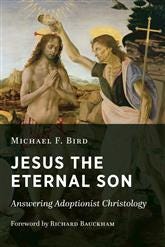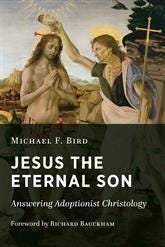Book # 18 was Jesus the Eternal Son: Answering Adoptionist Christology (Grand Rapids, MI: Eerdmans, 2017).
After the book/debate with Bart Ehrman about the divinity of Jesus, I felt like I’d only scratched the surface of what I wanted to say, still so many assumptions to be tested, and a few myths to be busted.
Whereas Ehrman and others have argued that the earliest recoverable christology was adoptionistic, i.e., Jesus became the divine son at his resurrection (Rom 1.3-4), then at his baptism (Mk 1.9-11), then at his birth (Matt 1, Luke 1), then in eternity past (John 1:1-18) - as the tradition progressed - I wanted to show that that was not the case.
Also, even the Ebionites, commonly thought to be a Jewish Christian sect in the second century with an adoptionist christology, held no such beliefs.
In fact, real adoptionist christology does not truly emerge until the late second century!
Now, to be clear, that does not mean that everyone ten minutes after Pentecost was walking around with an incipient form of the Nicene Creed inside their heads. While everyone believed that Jesus was divine, there was still some opacity or room for debate in what sense Jesus was divine and how he related to the divinity of the Father (on which Ehrman is correct). My point is that the earliest christologies, for all their diversities and limitations, do not yield a nice neat picture of an adoptionist christology gradually replaced by a pre-existence christology. I think the christological infrastructure for later creeds and confessions is already there in the first century.
To learn more, listen to this cool podcast I did with the OnScript crowd!





Questions Dr. Bird:
What if the New Testament authors used the concepts of adoption and sonship as a metaphor so the original readers could understand Jesus/Father relationship and Jesus as heir of the Father’s kingdom?
What if Jesus was seen as “divine” not in essence but in function, just as Paul’s first adam vs the last Adam?
My understanding is that the ANE peoples had a function worldview rather than an material/essence one (John Walton, “The Lost World of Genesis One”). What if this function worldview is reflected in the writings of the New Testament?
I am just thinking and asking.